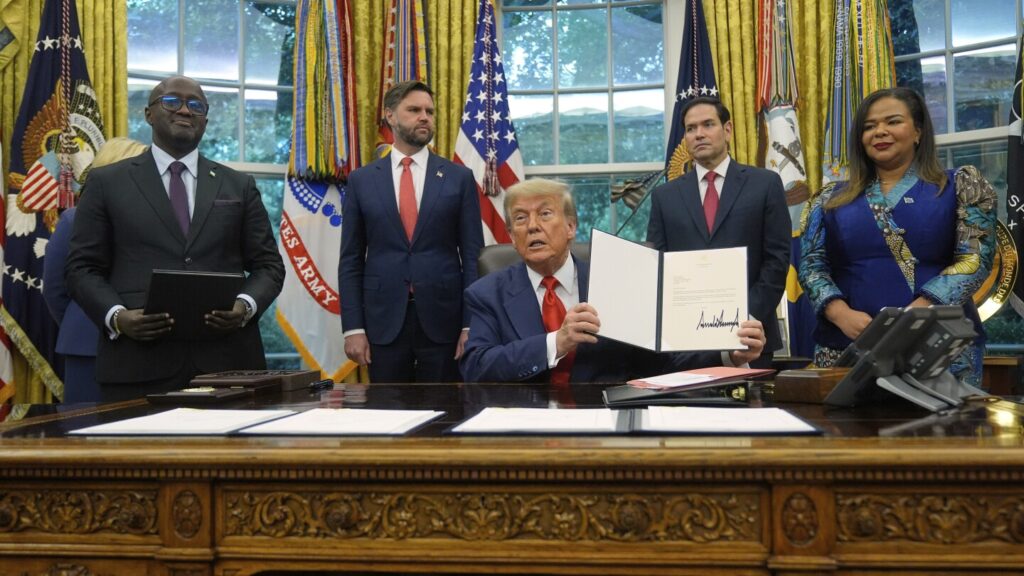DAKAR, Senegal (AP) — A deal signed in Washington on Friday has been touted as a major step toward peace in Congo following decades of conflict that has killed millions, including thousands this year.
The U.S.-mediated agreement is between Rwanda and the Democratic Republic of Congo, which has been battered by fighting with more than 100 armed groups. The most potent is backed by neighboring Rwanda, and it is not clear if it will abide by the deal as the group wasn’t part of the negotiations.
President Donald Trump says the deal gives the United States “a lot of the mineral rights” from Congo. His administration has pushed to gain access to minerals key to much of the world’s technology and is seeking to counter China, a key player in the region where the U.S. presence and influence have eroded.
Both the Congolese and Rwandan presidents are expected in Washington in a few weeks to “finalize the complete protocol and agreement,” U.S. Secretary of State Marco Rubio said.
Here’s a look at what we know about the agreement:
The terms of the deal
The agreement details general expectations but is short on how it will be implemented, particularly in getting the key actors of the conflict — the Rwanda-backed M23 rebels — to lay down their arms, according to a copy seen by The Associated Press.
The deal emphasizes the two neighboring countries’ sovereignty, territorial integrity and peaceful coexistence, with a commitment to halt all hostilities and any support for armed groups.
Although it denies supporting the M23 rebels, Rwanda has said it is protecting its border and going after the ethnic Hutus, whom it accuses of participating in the 1994 Rwandan genocide and now working with Congolese forces after fleeing to the neighboring country.
Armed gangs involved in the conflict may be reintegrated into Congolese security forces only after individual vetting based on loyalty, fitness and human rights records, the deal says.
In what the U.N. has called “one of the most protracted, complex, serious humanitarian crises on Earth,” the deal includes a commitment to protect and facilitate humanitarian access for displaced people in Congo, estimated to be more than 7 million.
The two countries also commit to creating an economic framework “to expand foreign trade and investment derived from regional critical mineral supply chains,” including ones that “link both countries, in partnership, as appropriate, with the U.S. government and U.S. investors.”
Uncertainty over whether the hostilities will end
Analysts say it is going to be difficult for the M23 rebels to withdraw from the cities they seized during their major advance this year and that such withdrawal may either take a long time or another round of fighting.
Rwanda is estimated to have thousands of troops supporting the M23 rebels in eastern Congo. Even if Rwanda ends its support for the rebels, the M23 has been consolidating its grip in the cities it has seized, setting up local administrative offices and enforcing a new governing structure.
A team of U.N. experts said in a report in December that Rwanda was benefitting from minerals “fraudulently” exported from areas in the region under the control of the M23. Rwanda has denied involvement.
The rebels were not directly involved in the U.S.-facilitated negotiations and have not spoken publicly about the deal. And Corneille Nangaa, leader of the Congo River Alliance, which includes the M23, told the AP in March that “anything regarding us which are done without us, it’s against us.”
Rwandan Foreign Minister Olivier Nduhungirehe pointed to separate talks happening in Qatar that are meant to get both Congo and the M23 rebels to agree among themselves how they will end the fighting. He also said Rwanda agreed to lift its “defensive measures.” It was not clear if he meant withdrawing the troops that Rwanda has said are defending its territorial interests.
What Congolese think of the deal
Of five people that the AP spoke to in the conflict-battered region, none of them was convinced the deal would quickly end the fighting.
They called for caution in granting the U.S. access to the region’s minerals — resources that even late Pope Francis had reprimanded developed countries for exploiting to the detriment of the Congolese.
“We draw the attention of the Congolese government not to give in completely or to sell the Congo to the Americans just because the United States has supported us in restoring peace,” said Hangi Muhindo, a resident of Goma, the city at the center of the conflict.
“The commitments to the United States must not jeopardize the future of our people,” he added.
Some also felt the agreement is only a part of the solution and called for more dialogue and justice.
“We want peace now, but we don’t want the therapy to be worse than the disease,” said Prince Epenge, spokesperson for the local opposition political coalition.
___
Justin Kabumba and Saleh Mwanamilongo in Congo contributed to this report.

